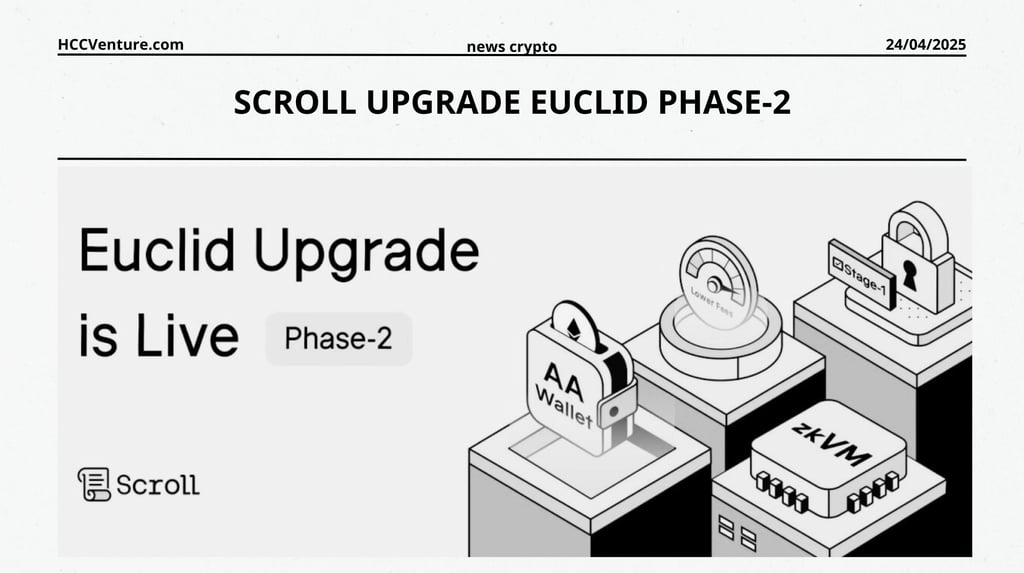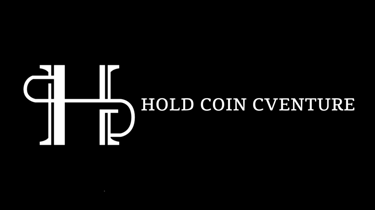Scroll Releases “Euclid” Upgrade – A Big Step Forward to Rollup Stage 1
Scroll, a Layer-2 network on Ethereum that uses zero-knowledge rollup (ZK-rollup) technology, has officially launched an upgrade called “Euclid”. This is considered the most important milestone for Scroll since its mainnet launch in 2023, marking the transition from “Stage 0” to “Stage 1”.
4/24/20253 min read


Background and significance of achieving Rollup Stage 1
In the Ethereum ecosystem, Layer-2 solutions like rollups are designed to improve scalability, reduce transaction costs, and maintain Layer-1 security. However, the decentralization level of rollups is often questioned, especially for networks in “Stage 0” – where components like sequencers or provers still rely on centralized operators.
According to Vitalik Buterin and L2Beat’s taxonomy, a “Stage 1” rollup must meet criteria such as: implementing a complete proof system, decentralizing fraud proof submission, and ensuring that users can exit transactions without the need for operator coordination. Scroll achieving this milestone with the Euclid upgrade confirms that the network has significantly reduced its reliance on centralized components, improving security and transparency.
Euclid Upgrade: 90% Fee Reduction, 4x Throughput, and Next-Gen Security
The transition to a more secure and scalable Layer-2 infrastructure has never been more important. As the total value locked (TVL) in DeFi recovers, on-chain AI agents grow, and new decentralized applications emerge every day, the technical foundation supporting these innovations must evolve at a similar pace. The Euclid upgrade marks the biggest change to the Scroll protocol since its mainnet launch. It is a complete overhaul, redefining what users and developers can expect from a ZK Rollup.
Euclid brings five major changes to the Scroll network:
Convert to OpenVM Prover
Transition to MPT state commitment
Optimized rollup process
Support EIP-7702 and RIP-7212
Ready to reach Stage-1
Convert to OpenVM Prover
One of the most significant changes is Scroll’s move from its legacy prover system to OpenVM Prover, an open-source tool designed to optimize complex transaction processing and increase transparency. OpenVM Prover not only improves the performance of zero-knowledge proof systems, but also allows the community to easily audit and contribute to the source code, promoting decentralization. This is especially important in building trust among developers and users, while supporting applications that require more complex transactions.
Applying Merkle-Patricia Trie (MPT) to State Commitment
Scroll has replaced the old state commitment structure (zktrie) with the Merkle-Patricia Trie (MPT), a data structure used natively on Ethereum. This transition brings two big benefits:
Increased Compatibility: MPT makes it easy for Layer-2 applications to integrate with existing Ethereum tools and applications, lowering the barrier for developers.
Improved sequencer performance: MPT optimizes transaction processing, reducing latency and increasing network throughput. According to Scroll, this has helped the network achieve a processing speed of more than 2,000 transactions per second (TPS).
Optimize Rollup Process and Reduce Data Costs
Euclid introduces several backend improvements to reduce data availability costs – an important factor affecting Layer-2 transaction fees. Specifically:
90% reduction in data costs: By optimizing the rollup process and eliminating bottlenecks such as the circuit capacity checker, Scroll has significantly reduced the cost of storing data on Ethereum Layer-1.
4x Throughput: Improvements in sequencer processing and prover system help the network process transactions faster, meeting the growing needs of the DeFi ecosystem and decentralized applications.
Support EIP-7702 and RIP-7212
Euclid integrates support for EIP-7702 (Ethereum Improvement Proposal) and RIP-7212 (Rollup Improvement Proposal), two improvement proposals aimed at improving user experience and interoperability:
EIP-7702: Enables the implementation of smart accounts features, which automate tasks through smart contracts. This provides a more user-friendly wallet experience, reducing complex steps for end users.
RIP-7212: Enhances Scroll's compatibility with Ethereum standards, ensuring applications on Scroll can work seamlessly with the broader ecosystem.
Remove Halo2 Circuits and Upgrade zkEVM
Scroll has removed halo2 circuits – the old zero-knowledge proof system – and upgraded the zkEVM (Zero-Knowledge Ethereum Virtual Machine) to more efficiently replicate Ethereum’s execution environment. This not only speeds up transaction processing but also reduces operational costs, while maintaining compatibility with existing smart contracts on Ethereum.
Challenges and future prospects
Although Euclid was a great step forward, Scroll still faced some challenges:
Fierce Competition: Other Layer-2s like Arbitrum, Optimism, and Unichain are also constantly innovating, requiring Scroll to maintain its technological edge.
Pressure from falling TVL: According to some sources, Scroll’s total value locked (TVL) hit a record low before Euclid launched. The upgrade needs to prove its ability to attract new users and capital.
Journey to Stage 2: To reach “Stage 2” – the fully decentralized stage, Scroll needs to continue removing “training wheels” like the Security Council and ensure the fraud proof system operates without permission.
Moving forward, Scroll has announced plans to integrate additional features such as cross-chain transaction support and expanded interoperability with other blockchains. These moves promise to solidify Scroll’s position as one of the leading ZK-rollups.
Conclude
Scroll’s Euclid upgrade is not only a technical milestone, but also a testament to the project’s commitment to decentralization and performance optimization. With improvements such as OpenVM Prover, MPT state commitment, EIP-7702/RIP-7212 support, and reduced data costs, Scroll has laid a solid foundation to compete in the Layer-2 ecosystem. While there are still challenges ahead, this event has established Scroll as a pioneering project that will shape the future of Ethereum and blockchain technology.
Explore HCCVenture group
HCCVenture © 2023. All rights reserved.

Connect with us
Popular content
Contact to us
E-mail : sp_contact@hccventure.com
Register : https://linktr.ee/holdcoincventure
Disclaimer: The information on this website is for informational purposes only and should not be considered investment advice. We are not responsible for any risks or losses arising from investment decisions based on the content here.


TERMS AND CONDITIONS • CUSTOMER PROTECTION POLICY
ANALYTICAL AND NEWS CONTENT IS COMPILED AND PROVIDED BY EXPERTS IN THE FIELD OF DIGITAL FINANCE AND BLOCKCHAIN BELONGING TO HCCVENTURE ORGANIZATION, INCLUDING OWNERSHIP OF THE CONTENT.
RESPONSIBLE FOR MANAGING ALL CONTENT AND ANALYSIS: HCCVENTURE FOUNDER - TRUONG MINH HUY
Read warnings about scams and phishing emails — REPORT A PROBLEM WITH OUR SITE.
